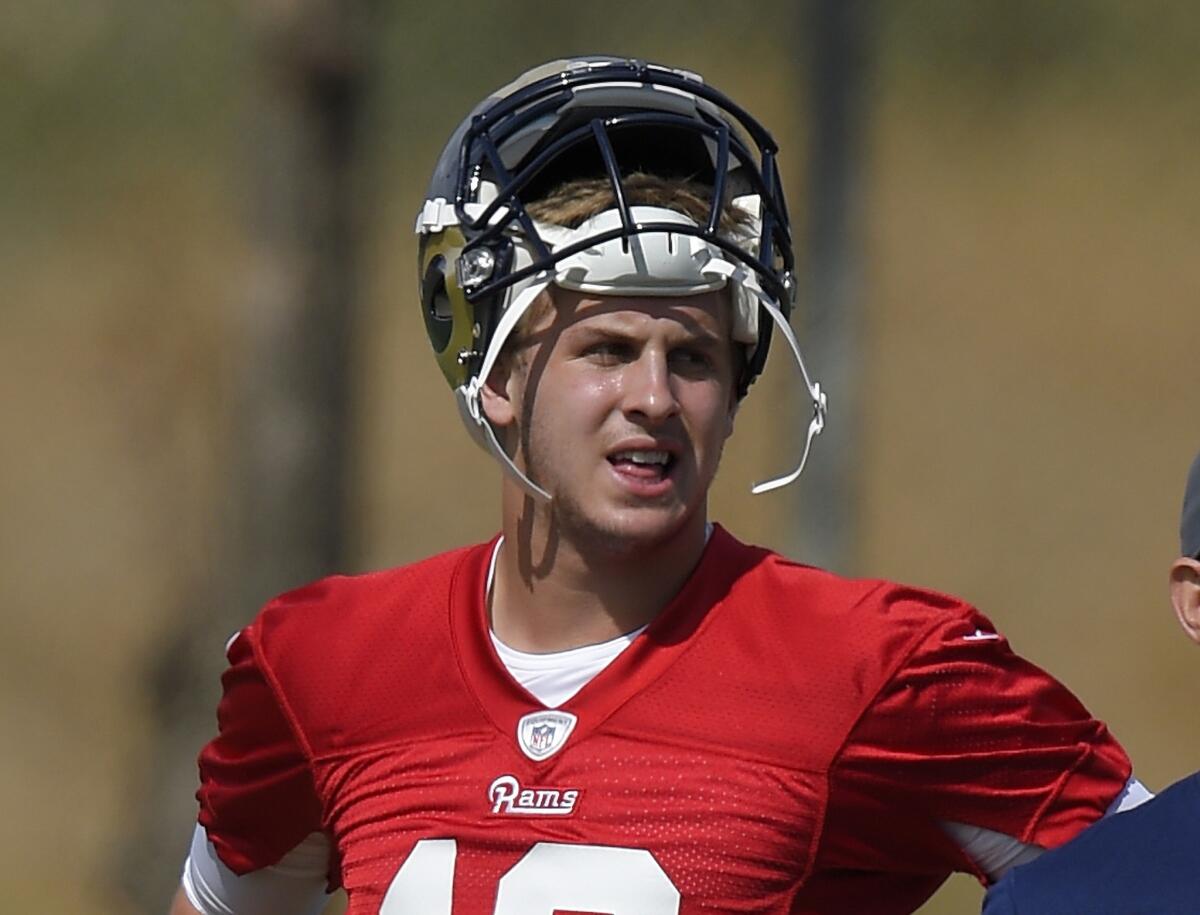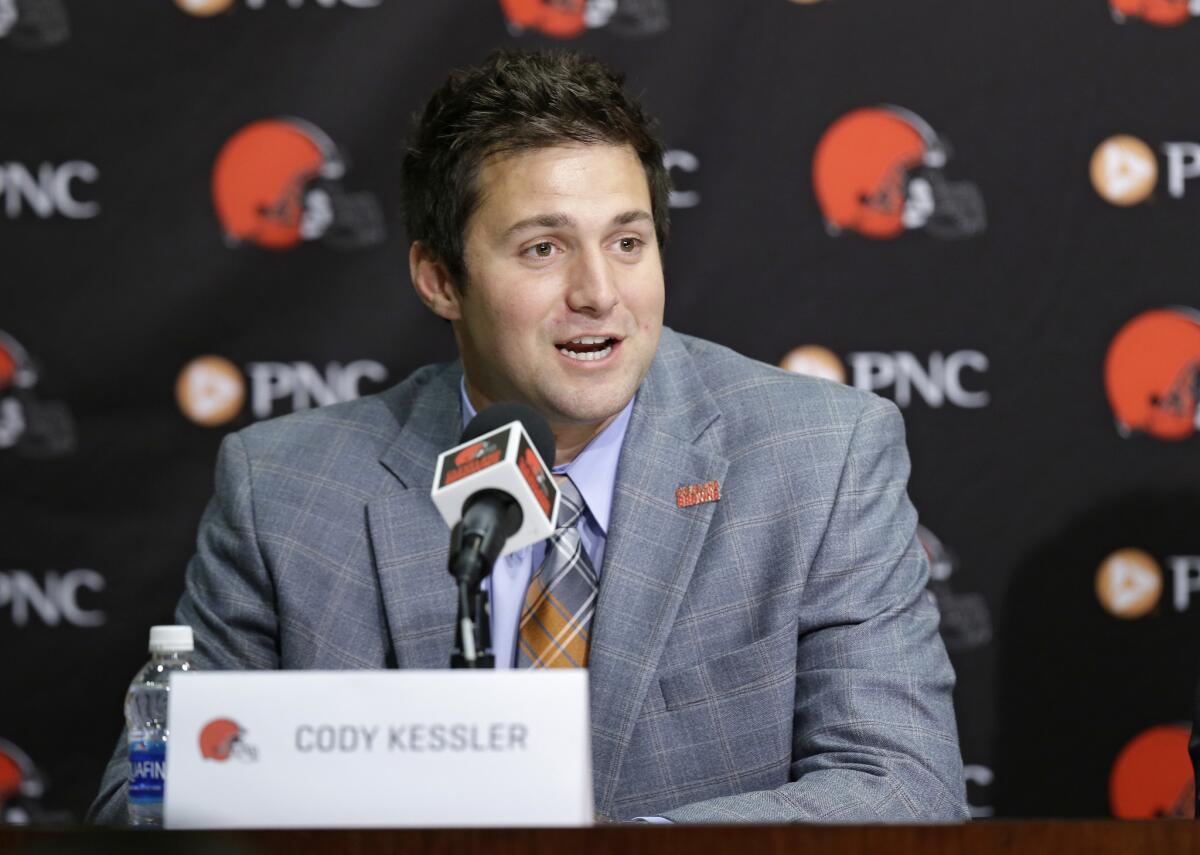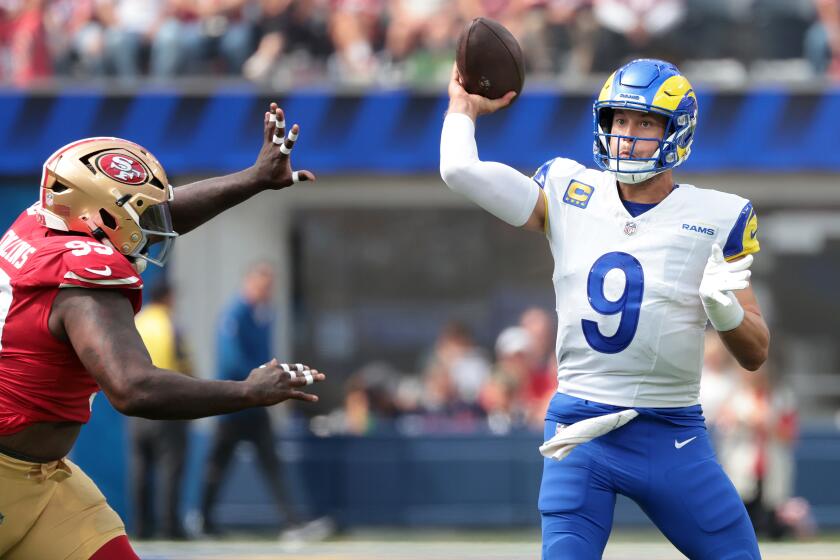Expectations will be high as Los Angeles Rams rookie Jared Goff makes transition to NFL

Rams quarterback Jared Goff is seen during the Rams rookie minicamp in Oxnard, Calif. on May 6.
- Share via
Before he moves forward as Rams quarterback, Jared Goff needs to move backward. Again and again.
The No. 1 pick in last month’s NFL draft is making the transition from a spread to a pro-style offense, taking snaps from under center for the first time since his freshman year in high school. It’s a fairly common transformation these days — fellow first-round pick Paxton Lynch faces a similar learning curve with the Denver Broncos — but it’s more complicated than meets the eye.
“Passing the football is rhythm and timing,” Rams quarterbacks coach Chris Weinke said during a rookie mini-camp last week. “When I’m under center, that rhythm and timing is different than when I’m in the [shot]gun. If I haven’t done it since I was 14 years old, and now I come to this level with the speed of the game, there’s a transition.
“We felt like this kid has the mental capacity to pick it up, the physical ability to be able to make the transition, and we saw it today. We had a walk-through earlier, and from that walk-through to the second walk-through he got better. So there’s growth on Day 1, and that’s what we truly believed in when we drafted the guy.”
The Rams say they won’t play Goff until he’s absolutely ready to step into the job and that they’ve got a sturdy bridge player in quarterback Case Keenum, who has won NFL games. But the reality is, the days of sitting a high-drafted rookie the way the Philadelphia Eagles did with Donovan McNabb, the San Diego Chargers did with Philip Rivers or the Green Bay Packers did with Aaron Rodgers are distant memories.
The expectation is a first-round rookie steps in and plays right away, especially one that cost so much in terms of draft picks, the Rams making an unprecedented trade up from No. 15.
Goff is not alone in that category. Carson Wentz, the No. 2 pick, is shouldering the same expectations in Philadelphia, as is Lynch in Denver. Second-round pick Christian Hackenberg is in the spotlight with the New York Jets, even as the expectations are that the club will eventually work through its contractual impasse with Ryan Fitzpatrick.
I’m treating it as if I’m the starter. I’m going to come in there and compete for a spot.
— Browns rookie quarterback Cody Kessler

Browns rookie quarterback Cody Kessler answers questions during a news conference at the team’s trianing camp facility on Apr. 30.
And the stage is set for a quarterback competition in Cleveland, which took USC’s Cody Kessler in the third round. Although many evaluators think that taking Kessler that early was a reach and that he’s best suited to be a No. 3 and work his way up, the Browns seem to be more comfortable inserting him sooner. Cleveland, which has had 24 starting quarterbacks since re-launching as an expansion franchise in 1999, signed Robert Griffin III in March.
“If there’s a team that has a 15-year vet or if there’s an open competition, I’m treating it as if I’m the starter,” Kessler told reporters last week. “I’m going to come in there and compete for a spot, but I’m not going to be arrogant.”
It used to be that young quarterbacks sat, sometimes for years, and learned at the elbow of reliable veterans. A seismic shift happened in 2008, when the Atlanta Falcons took Matt Ryan with the third pick, the Baltimore Ravens took Joe Flacco with the 18th and both quarterbacks not only started their entire rookie seasons but also reached the playoffs. No rookie quarterback had done that before. (Peyton Manning was the Day 1 starter for the Indianapolis Colts a decade earlier, for instance, but the Colts went 3-13 during his rookie season.)
Since Ryan and Flacco entered the league, at least one rookie quarterback has started his team’s opener, among them the Detroit Lions’ Matthew Stafford, the Colts’ Andrew Luck, the Oakland Raiders’ Derek Carr and last year’s Nos. 1 and 2 picks, Jameis Winston of the Tampa Bay Buccaneers and Marcus Mariota of the Tennessee Titans.
Rams General Manager Les Snead was a scout in Atlanta when the Falcons drafted Ryan and said the team started him only because he was ready to go, not because of external pressure to do so.
However, Snead said the league could be in a “swing cycle” back to the time when it was OK to sit a rookie quarterback for a while because of what he sees as a widening gap in styles between NFL and college offenses.
“It’s still relatively simple to go and pick out, ‘That guy has the traits to play in the NFL and be successful,’ ” Snead said. “What’s getting harder is, how long is it going to take that guy — whether he’s a wide receiver, an offensive lineman, or a quarterback — to be ready? You’ve got to learn to take a snap for the first time, even if that seems odd. Learn to call a protection, learn multiple cadences. We all know that while you’re learning something, you’re a little slower. So the key is, don’t put the guy out while he’s still a little slower while he’s learning it.”
Former NFL quarterback Kurt Warner, who led the St. Louis Rams to a Super Bowl victory, said the act of dropping back to pass is more complex than most people realize. A quarterback’s drop meshes with the route timing of his receivers, so a passer will know by his own feet where his receivers are at any given point.
“The hard part is developing that timing when you’re in shotgun and you’re not taking a drop,” said Warner, now an NFL Network analyst. “That to me is the hardest part. I think all of these quarterbacks can develop an ability to drop back and throw from under center. But there’s no question when you’re learning a million different things and trying to get acclimated with the speed, the last thing you want to have to work on is being able to take a center snap and drop back five yards and think about that aspect of things, when you really want to be thinking about just the mental side of playing this game.”
Sonny Dykes, Goff’s coach at California, said the transition could be easier for Golden Bears quarterbacks, who are asked to make sophisticated reads of a defense.
“What I think gives our guys a chance at the next level is ... we do a lot of full-field reading,” Dykes said. “So Jared, a lot of times it’s based on, ‘If this guy does this, you do this.’ We asked him to read pre-snap and before the snap decide, ‘I’m throwing it here.’ We also ask him to read one specific guy, a half-field read. ‘OK, if this guy does this, throw it to this guy.’ We also ask for full-field reads, where he drops back and may start to the left, and he’s going to progress all the way through his reads and get to his fourth or fifth read.
“Just what they’d ask [in the NFL]. I don’t know what else they’d ask a guy to do.”

Gary Klein and Lindsey Thiry discuss quarterback Jared Goff’s debut at the Rams’ rookie mini-camp in Oxnard. All six of the Rams’ draft picks participated, plus 19 undrafted free agents.
Dykes has no concerns about Goff making the under-center transition quickly and seamlessly.
“Sure, there’s some footwork things involved,” he said. “If you were talking about a guy here that had slow feet or wasn’t good in the pocket, I could see where you could say he’d have a hard time adjusting. But we’re talking about a guy here that’s got as good a feet as anybody I’ve ever seen. That’s what makes him unique.”
sam.farmer@latimes.com
Twitter: @LATimesfarmer
More to Read
Go beyond the scoreboard
Get the latest on L.A.'s teams in the daily Sports Report newsletter.
You may occasionally receive promotional content from the Los Angeles Times.











